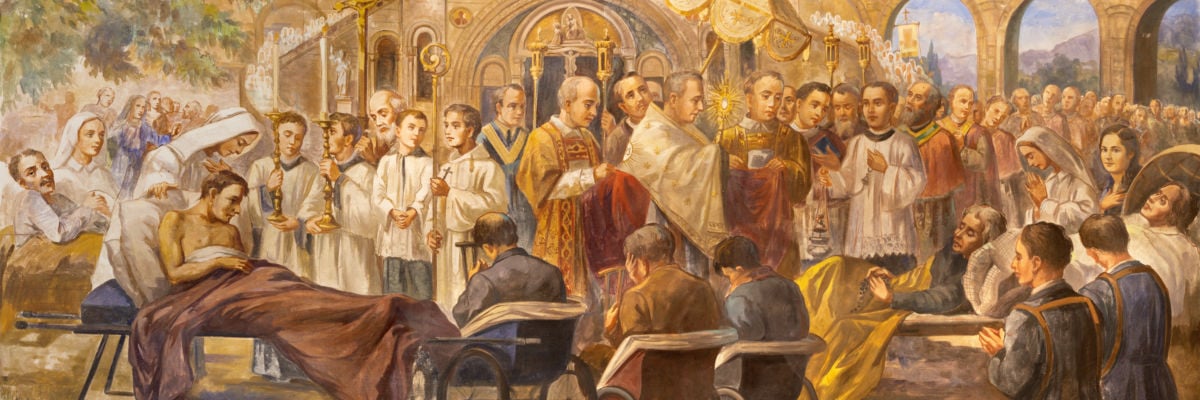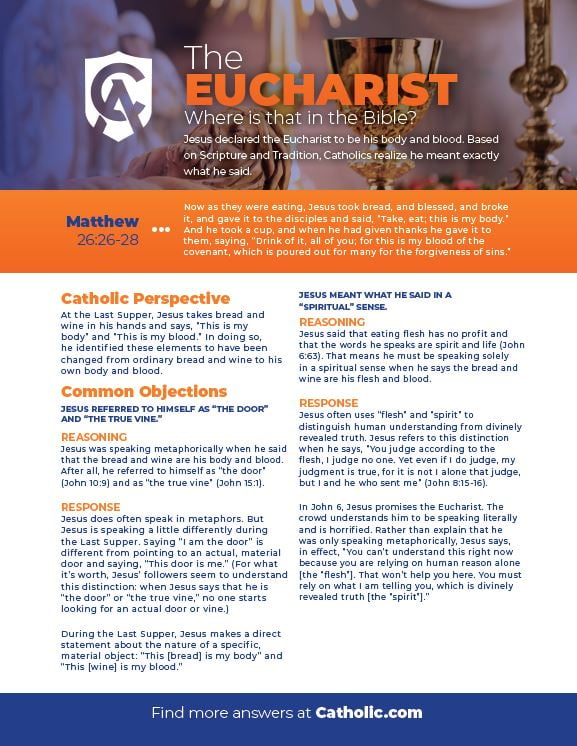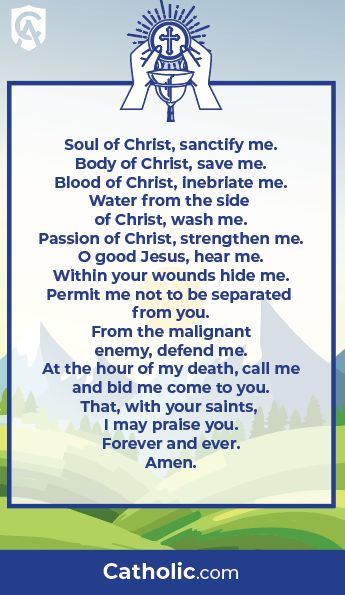
What Is the Feast of Corpus Christi?
The Feast of Corpus Christi, also known as the Solemnity of the Most Holy Body and Blood of Christ, is a Catholic celebration of the real presence of Jesus Christ in the Eucharist—and thus a sacred reminder that, in every Mass, Jesus’ one sacrifice of Calvary is sacramentally made present and offered anew for “the forgiveness of the sins we daily commit” (CCC 1366).
While Holy Thursday recalls Christ’s institution of the Eucharist at the Last Supper, Corpus Christi gives Catholics a joyful opportunity to honor our Eucharistic Lord Jesus in the Blessed Sacrament. This includes public devotion apart from Mass.
When Is the Feast of Corpus Christi?
In 2026, Corpus Christi falls on Thursday, June 4. This is the Thursday following the Solemnity of the Most Holy Trinity (Sunday, May 31). However, in most dioceses in the United States, and in many other countries, the celebration is transferred to the following Sunday, so Corpus Christi will be celebrated in 2026 on June 7. This is so that more of the faithful can participate. The feast remains anchored in its traditional Thursday observance on the Church’s liturgical calendar. Additionally, the traditional Thursday observance mirrors Holy Thursday, when Jesus instituted the Eucharist at the Last Supper, directing his apostles to offer his body and blood “in remembrance of me” (Luke 22:19).
Jesus offers himself under the sacramental forms of bread and wine; i.e., according to the priestly/sacrificial order of Melchizedek (1 Cor. 11:23-26; see Gen. 14:18-20; Heb. 5:1, 7-10).
Free Printable PDF Bible Sheet | The Eucharist: Where is that in the Bible?
Why Does the Catholic Church Celebrate Corpus Christi?
The Church celebrates Corpus Christi to profess and adore our Eucharistic Lord. Jesus is truly present body, blood, soul, and divinity in the Eucharist. At every Mass we partake of the Lamb of God, the New Covenant Passover sacrifice. Not only that, this feast highlights the sacramental and sacrificial reality of Christ’s presence. Additionally, it affirms the Church’s teaching on transubstantiation, and invites the faithful into deeper Eucharistic devotion.
How Did the Feast Begin?
The visions of St. Juliana of Liège (modern day St. Juliana) inspired the Feast of Corpus Christi. St. Juliana, a thirteenth-century Norbertine religious, saw a moon with a dark spot in a vision. This symbolized the absence of a liturgical feast to specifically honor the Real Presence. With the support of theologians and other Church leaders, particularly Archdeacon Jacques Pantaléon—the future Pope Urban IV—Corpus Christi was first celebrated in the Diocese of Liège in 1246.
Therefore, in 1264, just a year after the Miracle of Bolsena in central Italy in 1263, Pope Urban IV instituted Corpus Christi as a universal feast in the Church. He did so through his papal bull Transiturus de hoc mundo.
What Was the Miracle of Bolsena?
The Miracle of Bolsena occurred in 1263, when a German priest known as Peter of Prague was struggling with doubts about the Real Presence. He prayed fervently against these doubts, and, right after he pronounced the words of consecration during Mass, he noticed that blood began to seep from the host. The blood stained the corporal (a small linen cloth used on the altar during Mass), which Peter later brought to Pope Urban IV, who resided in nearby Orvieto at the time.
Moreover, this Eucharistic miracle further affirmed Catholic teaching on the Real Presence, while directly leading to the global celebration of the Corpus Christi Feast.
Because of this miracle, many pilgrims and tourists continue to visit the Basilica of St. Christina in Bolsena, where this Eucharistic miracle took place. They also visit the Cathedral of Orvieto, in which the miraculous, blood-stained corporal is reserved.
Carlo Acutis and Eucharistic Miracles
Blessed Carlo Acutis, who will be the first millennial canonized, had a profound devotion to the Eucharist. As Carlo often said, “The Eucharist is the highway to heaven.” As a teenager, Carlo created an of Eucharistic miracles to help others believe in the real presence of Jesus Christ in the Blessed Sacrament. Moreover, Carlo believed that discovering the wonders of these miracles could reignite faith in those who doubt the Real Presence, especially in an age of skepticism and spiritual distraction. Carlo’s canonization date is set for September 7, 2025.
The Feast of Corpus Christi celebrates the very truth that moved Carlo’s heart: that Jesus Christ is truly present body, blood, soul, and divinity in the Eucharist. Additionally, many parishes now feature Carlo Acutis’s Eucharistic Miracles Exhibit during Corpus Christi celebrations. Furthermore, new generations are drawn into deeper love and reverence for our Eucharistic Lord as they encounter him in the Blessed Sacrament.
Did St. Thomas Aquinas Compose Hymns for Corpus Christi?
Yes, Pope Urban IV commissioned St. Thomas Aquinas to compose the liturgical texts and hymns for the Feast of Corpus Christi. These include:
- “Pange Lingua,” including the famous “Tantum Ergo”
- “Lauda Sion”
- “Adoro Te Devote”
These hymns are still sung today during Eucharistic processions on Corpus Christi, as well as during benediction and related Eucharistic adoration. They express well the Church’s rich theological reverence for the Blessed Sacrament.
What Is a Eucharistic Procession?
A Eucharistic procession is a public act of worship in which the Blessed Sacrament is carried in a monstrance, and incensed, through the streets of a local parish or city. The faithful follow, singing hymns and praying other prayers.
Additionally, this tradition symbolizes the Church’s mission to carry Christ to the world (Matt. 28:18-20). It also publicly professes the Catholic belief in the real presence of Jesus in the Eucharist—safeguarding the teaching of Jesus himself (John 6:53-58; Matt. 26:26-28). Eucharistic processions often occur on Corpus Christi, taking place immediately after the final blessing and dismissal of Mass.
How Is It Celebrated Today?
In the Catholic Church
- Mass in honor of the body and blood of Christ
- Eucharistic adoration and benediction
- Processions through neighborhoods, parishes, and cities
- Singing of Eucharistic hymns, particularly those of St. Thomas Aquinas
Around the World
- In countries like Spain, Poland, and Austria, Corpus Christi is a public holiday with elaborate cultural traditions
- In the United States, it is celebrated on Sunday, and increasingly observed with public processions, such as during the National Eucharistic Revival (2022-2025)
Is Corpus Christi a Holy Day of Obligation?
In some countries, yes, the Thursday following Trinity Sunday is a holy day of obligation. In the United States, however, Corpus Christi proper is not a holy day of obligation. Nevertheless, the faithful in America are welcome to join with others around the world in commemorating the feast in familial ways on the Thursday after Trinity Sunday.
However, the faithful in America have an obligation to participate in Mass, because the United States transferred the solemnity of Corpus Christi to the ensuing Sunday. Since Sundays are already holy days of obligation for Catholics, this ensures the celebration of the feast with full participation of the faithful. Therefore, the celebration of Corpus Christi Feast Day remains through liturgical observance.
What Prayers Can I Say for this Feast?
Honor Jesus in the Eucharist with these prayers, hymns, and devotions:
- “Tantum Ergo” or the larger “Pange Lingua”
- Anima Christi Prayer
- Eucharistic adoration (in person or online)
- Divine Mercy Chaplet in thanksgiving for the Eucharist
- Rosary with a focus on the Luminous Mysteries
Free Printable PDF Download | Anima Christi Prayer
How Does Corpus Christi Relate to Holy Thursday?
Ultimately, Corpus Christi and Holy Thursday celebrate the Eucharist, but Holy Thursday sits within the spiritually sober context of Holy Week. And so, the joy of Christ’s institution of the Eucharist at the Last Supper is tempered by the impending memorial of his Passion and death. Corpus Christi continues the joy of the recently ended Easter season, celebrating the gift of the Eucharist at Mass and through public processions.
Why Was Corpus Christi Instituted as a Separate Feast?
In summary, the institution of the Feast of Corpus Christi provides the faithful with a special, unencumbered occasion to adore the Eucharist apart from Holy Week. Additionally, the Church desired a day dedicated solely to celebrating the real presence of Jesus Christ in the Blessed Sacrament.
How Can I Celebrate Corpus Christi 2025?
- Make sure to participate in Mass at your parish on Sunday, June 7
- Take part in your parish’s Corpus Christi procession
- Attend Eucharistic adoration or benediction in your diocese
- Pray or sing one of the traditional hymns by St. Thomas Aquinas
- Reflect on the Miracle of Bolsena, as well as the mystery of the Real Presence in general
- Share the beauty of this feast with family, friends, and/or on social media
- Explore Catholic Answers resources to deepen your Eucharistic faith
Related Content
Podcasts
The Mass: Re-Presentation of the Sacrifice of Jesus
A Deep Dive into the Real Presence of the Eucharist
Why Can’t Everyone Receive the Eucharist?
Articles
What the Early Church Believed: The Real Presence
Q & A
Why Can Only Priests Consecrate the Eucharist?
Isn’t the Eucharist Just Symbolic, Since Jesus Could Only Sacrifice Himself Once?
Praying Before the Blessed Sacrament Highly Recommended
Books
Carlo Acutis: Holiness for the Third Millennium




